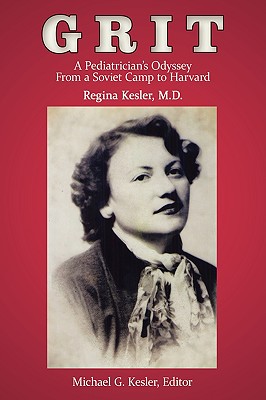Grit - A Pediatrician's Odyssey from a Soviet Camp to Harvard tells the drama of a Polish-Jewish family's fight for survival during World War II. Shortly after the Germans invaded Poland in September 1939, Regina and her family fled their hometown, Suwalki, and landed in Vilna, Lithuania. A year-and-a-half later, Stalin's secret police deported the family to a slave labor camp in southern Siberia. Arrangements between Stalin and the Polish government-in-exile, at the end of 1941, freed all Polish prisoners in the Soviet Union, and the family moved to Kyrgyzstan in Central Asia, where they lived until the end of the War. Upon their return to their hometown in 1945, they found all its Jews exterminated, and soon the family emigrated to Sweden. In 1947, Regina arrived to study in the United States. The memoir depicts a personal portrait of Regina, a gifted, young woman grown into adulthood amid a world convulsed by a gruesome war. At 14, she bravely ventured, at night, across the new Soviet-German border to arrange the rescue of her mother and little brother stranded on the German side of the border. Two years later, she fearlessly fought off the Soviet camp commander's attempt to rape her. Shortly after the family's arrival in Kyrgyzstan, the father disappeared and Regina took charge of the family, to stave off hunger and cold. Bold and resourceful, she saved her father several times, upon his rejoining the family, from the jaws of the Soviet secret police intent on sending him, again, to the front. Determined to be a physician, she succeeded to attend Moscow Medical School, and after coming to this country, fought against odds to enter Harvard Medical School. This personal drama bears vivid testimony to the courage and resilience of Jewish survivors of the Holocaust who - homeless, penniless, and often ill - clung to life, hope, and the pursuit of their aspirations.
| FindBook |
有 1 項符合
Grit: A Pediatrician’s Odyssey from a Soviet Camp to Harvard的圖書 |
 |
Grit: A Pediatrician’s Odyssey from a Soviet Camp to Harvard 作者:Kesler 出版社:Authorhouse 出版日期:2009-03-17 語言:英文 規格:精裝 / 212頁 / 22.9 x 15.2 x 1.5 cm / 普通級 |
| 圖書館借閱 |
| 國家圖書館 | 全國圖書書目資訊網 | 國立公共資訊圖書館 | 電子書服務平台 | MetaCat 跨館整合查詢 |
| 臺北市立圖書館 | 新北市立圖書館 | 基隆市公共圖書館 | 桃園市立圖書館 | 新竹縣公共圖書館 |
| 苗栗縣立圖書館 | 臺中市立圖書館 | 彰化縣公共圖書館 | 南投縣文化局 | 雲林縣公共圖書館 |
| 嘉義縣圖書館 | 臺南市立圖書館 | 高雄市立圖書館 | 屏東縣公共圖書館 | 宜蘭縣公共圖書館 |
| 花蓮縣文化局 | 臺東縣文化處 |
|
|
圖書介紹 - 資料來源:博客來 評分:
圖書名稱:Grit: A Pediatrician’s Odyssey from a Soviet Camp to Harvard
|











